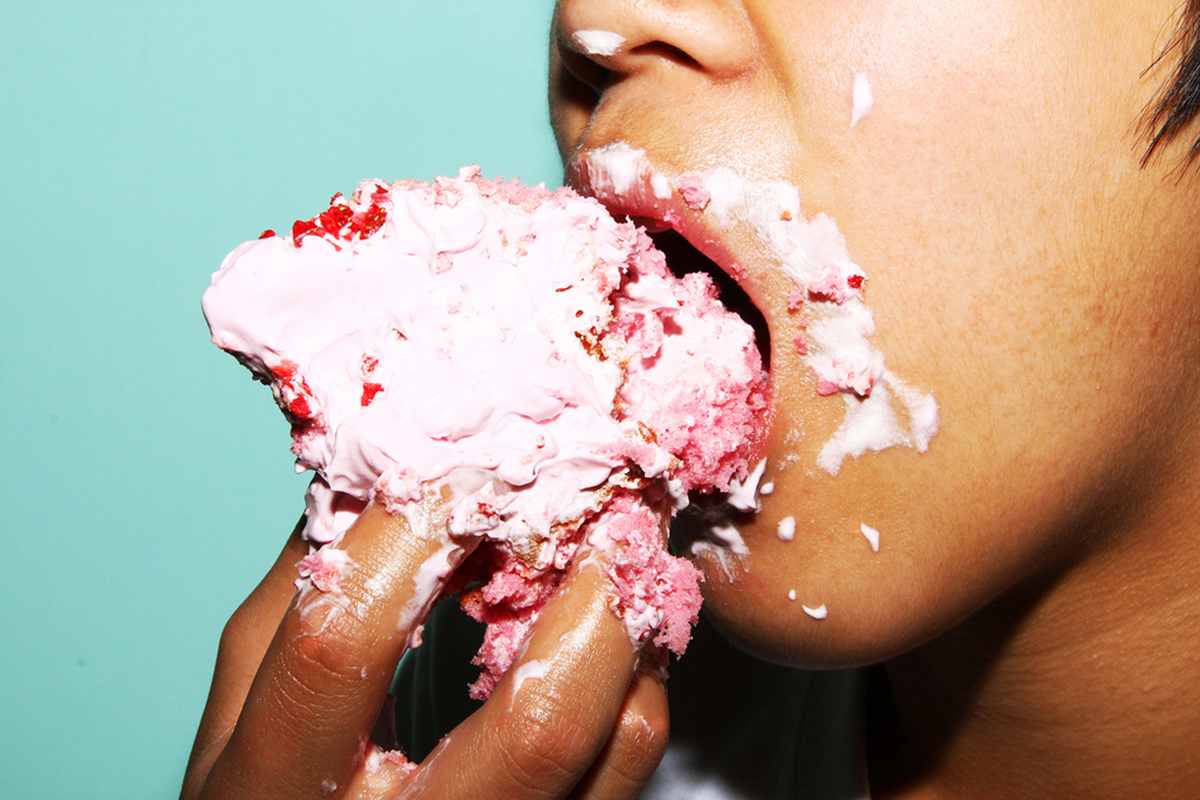People think everyone with an eating disorder is a really skinny person whose wrist might break if you shook their hand, or is the girl running to the toilet and making herself retch when she eats a whole pizza. These horrendous generalisations aside, there is another eating disorder, only whispered about, mostly forgotten: Binge-Eating Disorder.
Binge-Eating Disorder is just as serious as Anorexia and Bulimia Nervosa, but receives little attention.
Binge-Eating Disorder is not the same as overeating. Everyone overeats on occasion. Who hasn't forced in that extra slice of birthday cake, because it was chocolate and calling to them? Who hasn't had seconds on the roast potatoes in the holiday period, and found their bulging stomach straining against the too-tight top-button of their jeans.

That's not binge-eating disorder. Occasional excess is not a mental illness. That kind just calls for an antacid and a self-warning to not get so carried away in future.
People with binge-eating disorder frequently feel compelled to eat a large amount of food over a short period of time; they feel they lack any self-control, and may eat even when not hungry. Some people plan binges in advance, buying in special "binge" foods for the purpose, such as cookies or cakes. Others describe being "in a daze", and being unsure of what they're eating or why.
Binges are followed by feelings of shame, guilt and embarrassment. The person with binge-eating disorder is often disgusted by their own behaviour. This shame and self-disgust lowers their self-esteem and may drive them to another binge.
Binge-eating disorder has only recently been recognised as an eating disorder equal with Anorexia and Bulimia Nervosa, being added to the DSM-V. This is good news for sufferers of this insidious disease. Finally, this forgotten eating disorder has been granted legitimacy by psychiatrists, and people experiencing it should no longer be seen as "overeaters". Finally, the correct treatment can begin.
Who can develop Binge-Eating Disorder?
Up to 2.6% of people have binge-eating disorder. The numbers of men and women affected are pretty much equal. Most of the time, the disorder develops as a young adult, but most people don't seek help until well into their 30s.
Do I have Binge-Eating Disorder
If you notice the following symptoms, you may have BED:
- Do you eat more rapidly than usual?
- Do you eat a lot in a short space of time?
- Do you eat until you feel uncomfortably full?
- Do you eat, even when not physically hungry?
- Do you frequently binge alone, at night, or when other people can't see you?
- Do you feel ashamed, guilty, or disgusted after you binge?
- Do you feel unable to control the amount you're eating?
- Do you stockpile high-carb or sweet food, especially for bingeing at a later date?
- Do you feel numb while bingeing?
Why does Binge-Eating Disorder matter?
Binge-eating disorder puts you at risk of many serious physical problems, some of which are life-threatening:
- Heart disease, caused by raised blood pressure and high cholesterol. One in every four deaths in the United States is due to heart disease
- Type 2 Diabetes, caused by bingeing on high-sugar foods, raising blood sugar levels artificially
- Osteoarthritis, pain and swelling in the joints, caused by weight gain
- Sleep Apnoea, pauses in breathing while you sleep, caused by weight gain
- Gallbladder disease, caused by high-fat diet
- Gastrointestinal problems
READ Psychological elements of eating disorders
You can also find that emotional problems, such as depression and anxiety, will get worse the longer you experience binge-eating disorder.
More About BED
Causes of Binge-Eating Disorder
No-one is quite sure what causes BED, but there are several factors that have been shown to raise the risk of developing the eating disorder:
- Low self-esteem
- Depression
- Anxiety
- Dissatisfaction with your body
- Negative feelings (for example: stress, loneliness, boredom, or anger)
- Traumatic personal history (for example, a history of abuse)
- Having previously been on a restrictive diet where you cut-out food groups, skipped meals, or ate small portions with few calories.
- Family history of eating disorder

Treatment of Binge-Eating Disorder
Treatment for binge eating disorder has two aims: to tackle the underlying psychological issues, and to help with your weight management. The first priority is to help with the psychological issues, as it's impossible to tackle your weight without dealing with those issues first.
Treatment often includes medication, such as a selective serotonin reuptake inhibitor (SSRIs). Therapy comes in several forms:
- Cognitive Behavioural Therapy, which aims to alter maladaptive thoughts about food into healthy ones
- Self-help, which may involve using a book or working with a self-help group
- Group therapy, which involves working in a therapeutic group under the supervision of a therapist.
When therapy is underway, and the psychological issues are being dealt with, you may work with a nutritional professional to decide on a balanced diet that will be healthy and help you lose weight.
It's important to attend both parts of the treatment. Therapy alone won't help you reach a health weight, and losing weight won't tackle your psychological issues.
Serotonin and BED
As part of your treatment, you may be prescribed selective serotonin reuptake inhibitors (SSRIs). These may be useful for a while, helping to life and regulate your mood, which will improve your eating habits in the short-term.
This is partly because people with binge-eating disorder often binge on carb-rich sugary foods that boost the serotonin in the body and give your mood a life. For individuals with BED, who have low self-esteem and feel full of guilt and self-loathing, this temporary boost is addictive, which drives them to binge more.
By replicating the serotonin boost without food, SSRIs help the person feel good about themselves, and teach them they don't need to binge to do it.
However, the long-term effectiveness of SSRIs as the treatment of BED is unknown.
Make Peace with Food
If you have BED, your first step is to accept that food is not the enemy. There are no "good" or "bad" foods. You must free yourself from that cycle of shame. This means that, if it's dinnertime and you want a pie with thick pastry and chockfull of meat and potatoes, don't go having a green salad instead. All that does is put you and food on opposite sides.
Remember: food isn't like other addictions. You need it to live.
If you crave something, don't deny yourself it. That just makes it more likely you'll binge later on. Have that pie. Enjoy it. Feel the pleasure of eating. Then move on.
READ Eating Disorders (Anorexia, Bulimia and Binge Eating) Among Males Becoming Common
Think you have BED?
If you think you have binge-eating disorder, it's time to do something about it. Book an appointment with your GP or primary care physician. They will be able to refer you to a therapist or an appropriate programme. Any health problems you may already be facing won't improve as this condition gets worse. So bite the bullet and get the help you need for this serious disorder.
You owe it to your body.
- www.cdc.gov/heartdisease/facts.htm
- www.eatingdisorderhope.com/information/binge-eating-disorder
- http://www.eatingdisorderhope.com/information/binge-eating-disorder/elevated-status-for-binge-eating-disorder-in-the-dsm-5
- http://www.eatingdisorderhope.com/information/binge-eating-disorder/renegotiating-binge-foods-in-binge-eating-disorder-recovery
- www.nhs.uk/conditions/binge-eating/Pages/Introduction.aspx
- www.nhs.uk/Conditions/Binge-eating/Pages/Treatment.aspx
- Photo courtesy of mst7022: www.flickr.com/photos/michaeltflickrpics/32175230/
- Photo courtesy of cc_photoshare: www.flickr.com/photos/cc_photoshare/10728238955/
- Photo courtesy of cc_photoshare: www.flickr.com/photos/cc_photoshare/10728238955/


Your thoughts on this